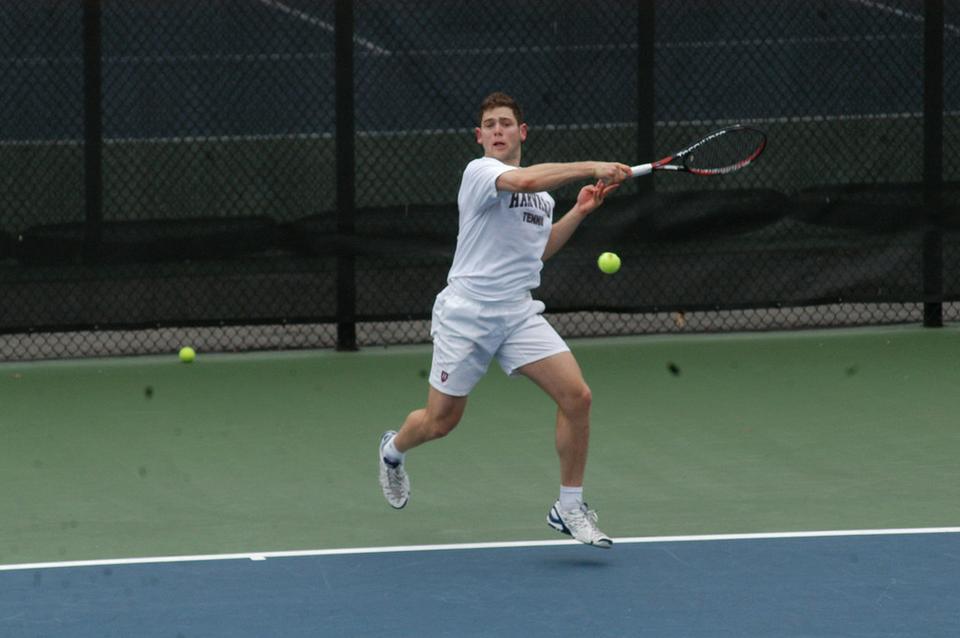
News
Summers Will Not Finish Semester of Teaching as Harvard Investigates Epstein Ties

News
Harvard College Students Report Favoring Divestment from Israel in HUA Survey

News
‘He Should Resign’: Harvard Undergrads Take Hard Line Against Summers Over Epstein Scandal

News
Harvard To Launch New Investigation Into Epstein’s Ties to Summers, Other University Affiliates

News
Harvard Students To Vote on Divestment From Israel in Inaugural HUA Election Survey
BREAKOUT TEAM OF THE YEAR: Men's Tennis

For the second straight year, the Harvard men’s tennis team defeated Dartmouth, 4-3, to close out Ivy League play. This time, though, the Crimson was not playing for a third-place finish—it was going for the title.
With its spot in the NCAA tournament secured, Harvard did not disappoint in the first round, topping Virginia Tech, 4-2. But the Crimson could not solve its second-round opponent, Florida, and a 4-0 loss to the Gators ended what had been a historic season.
In 26 matches, Harvard won 23 times, giving it a winning percentage of .884, the best mark of any Crimson team since 1968.
“Our record this year was certainly something we’ve been really proud of, especially compared to the last couple of seasons when our record was maybe not as good as we would’ve liked,” co-captain Alistair Felton says. “This season has just been incredible. A number of tight matches that we’ve somehow managed to get through have enabled us to set this record.”
The first sign of the team’s arrival onto the elite Ivy tennis scene may have been its Feb. 3 victory over Vanderbilt. The Commodores, at the time, were ranked 34th in the nation, and, perhaps indicative of the season as a whole, it took a Crimson freshman to propel the squad past its opponents.
“I think that win was certainly a catalyst for us,” Felton says. “It gave us belief that we could beat teams that are some of the best nationally. Also, to win the first really close match made us more comfortable when we got into tight situations in the future because we could look back and not think, ‘Oh no, this is going to be like that match where we lost 4-3.’ Instead, it was more like, ‘We’ve been in this position before, and we got through it, so we can get through again.’”
For the next two months and four days, Harvard lost only once—to Indiana, a team then ranked 27th nationally. During that stretch of time, the Crimson not only won the ECAC title but also the Hilton Mission Valley Spring Classic, a spring break tournament in which it upset No. 16 University of San Diego to win the championship.
Harvard’s winning streak reached 13, a number two less than its win total in 2011, one less than its victories in 2010, and tying the amount of wins it had in 2009.
“Even during that time, our mentality stayed the same,” freshman Denis Nguyen explains. “It was to play like a strong, mentally tough team out there every time we compete. That goal has always worked well for us.”
And, despite one league loss to Columbia, the Crimson finished Ivy play with a 6-1 record, earning its first Ivy title since 2008.
The championship-clinching win against Dartmouth was largely thanks to the clutch performances of Nguyen and fellow rookie Alex Steinroeder. The freshmen won consecutive matches to bring the Crimson back from a 3-2 deficit to take the match and sole possession of the Ivy crown.
“We really didn’t want to have to share the title with two other teams,” Steinroeder says. “Even though we technically would’ve been Ivy League champions still, this was a much sweeter way to earn that title.”
The championship marked Harvard’s first since 2008, meaning that none of the current players had won a league title prior to the Crimson’s 2012 run.
The addition of rookies Steinroeder and Nguyen, along with Shaun Chaudhuri and Henry Steer, meant a complete transformation in the starting six for Harvard. Though it is rare in itself to have four freshmen make the starting team, it is even rarer to have them be some of the most consistent players throughout the season. In singles play, the four starting freshmen went a combined 112-36 on the year, a winning percentage of over .750.
“The freshmen really changed the team this year,” Felton explains. “Not only with their level of play but also with their attitude towards training and the game. What is really great is that they are such a tight knit group within the team so that they have really supported and pushed each other all throughout the season.”
As the team has officially broken out, next year will be all about keeping the fire alive.
—Staff writer Juliet Spies-Gans can be reached at jspiesgans@college.harvard.edu.
Want to keep up with breaking news? Subscribe to our email newsletter.
